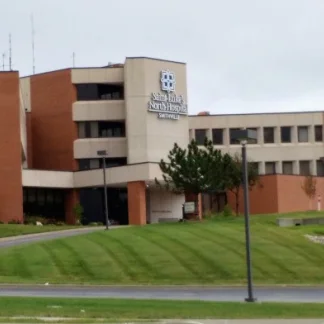Saint Lukes Northland Hospital
Smithville, Missouri, 601 South U.S. Highway 169, 64089
Available Programs
- Adolescence program
- Adult program
- Elderly program
- Hearing impaired program
- Young adult program
Insurance and Financial
- Medicaid
- Private insurance
- Self-pay options
- Medicare
- Military insurance
About this Facility
Saint Luke’s North Hospital’s Behavioral Health Program, located in Smithville, Missouri, is designed to meet the physical and behavioral health needs of patients facing life-disrupting emotions or mental illness.
St. Luke’s Northland Hospital offers inpatient care and aftercare.
The inpatient treatment program at St. Luke’s Northland Hospital is for those with serious mental health issues or dual diagnosis concerns. Those best suited for this program need a highly structured environment with medical and mental health professionals on staff 24 hours a day. Psychiatric treatment is provided, along with nursing care and medical treatment for those who need it. The focus of this program is to provide the stability that will allow for healing to take place. The foundational tenets of recovery begin to take place, along with assistance with mental health disorders.
Those who attend St. Luke’s Northland Hospital will be supported through their discharge process. Professional staff will help individuals create a plan for their next phase of treatment. This can include continued psychiatric care, therapy, and group therapy. It may also include connection to community resources or self-help groups.
Dual Diagnosis, often referred to as having co-occurring disorders, is when two or more mental health concerns present themselves simultaneously. It is very common for those who struggle with addiction to also have an underlying mental health concern such as anxiety, depression, or a diagnosable psychiatric disorder. Without proper treatment of the mental health issue at hand, getting and staying sober can be difficult. By treating both the substance use disorder and the mental health needs concurrently, a greater chance for long-term sobriety is achieved.
Mental health treatment focuses on helping individuals recover from mental illnesses like bipolar disorder, clinical depression, anxiety disorders, schizophrenia, and other challenging psychiatric conditions. Individual therapy, group therapy, and family therapy all serve as ways to deliver mental health support. These services can be administered in an inpatient setting, within an outpatient setting, or at a clinical office.
Contact us for more information: (816) 532-3700

Contact Saint Lukes Northland Hospital
Connect with Saint Lukes Northland Hospital by calling their admissions team directly.
(816) 532-3700 Website Get Directions